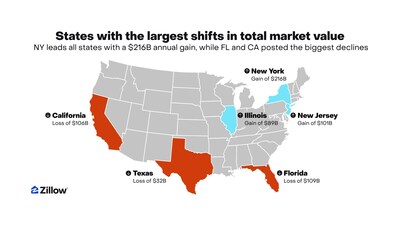US housing market reaches record $55.1 trillion
Werte in diesem Artikel
New York leads all states with a $216 billion annual gain, while Florida and California posted the biggest declines
- The U.S. housing market is worth a record $55.1 trillion, up $20 trillion since 2020. Housing gained $862 billion in the past year.
- Seven states saw their housing markets lose value over the past year, with the biggest drops in Florida (-$109 billion), California (-$106 billion) and Texas (-$32 billion). About one-quarter of the gains nationwide came from New York, which added $216 billion.
- Nine metro areas top $1 trillion in housing wealth. Collectively, they hold nearly one-third of all housing wealth, but smaller housing markets played an outsize role in the past year's gains.
SEATTLE, Sept. 8, 2025 /PRNewswire/ -- America's homes are now worth a record $55.1 trillion, a massive $20 trillion jump since the eve of the pandemic, according to a new Zillow® analysis. But growth has slowed in the past year as high costs cooled buyer demand, with U.S. housing gaining a modest $862 billion.
For most households, a home is their biggest financial asset, meaning even modest changes in value can ripple through family budgets and the broader economy. This year's shifts show how the geography of home value gains is rotating away from pandemic boomtowns, as well as the role new construction is playing in shaping long-term housing wealth.
"Even as buyers struggled with rising costs, U.S. housing wealth kept climbing," said Orphe Divounguy, senior economist at Zillow. "New construction opened the door for many first-time homeowners, creating trillions in wealth that didn't exist five years ago. Home value gains are a windfall for longtime homeowners, but they also highlight how housing deficits that sent prices soaring left behind many aspiring first-time buyers. The bottom line is that we need more homes to solve our chronic affordability crisis."
Housing gains move north as Sun Belt loses steam
The housing market is shifting. Pandemic boomtowns in the South and Mountain West are cooling, passing the baton to states in the Northeast and Midwest. One likely factor is that the Sun Belt's affordability edge has eroded through massive home value gains and rising insurance costs.
Since early 2020, the largest total value gains have been in California ($3.4 trillion), Florida ($1.6 trillion), New York ($1.5 trillion) and Texas ($1.2 trillion). But three of those four lost ground in the past year. Florida's housing market fell by $109 billion, and California's by $106 billion.
New York, on the other hand, was part of the Northeast revival, gaining $216 billion over the past year. That is the biggest increase of any state, and it accounts for one-quarter of the national growth. Neighbor New Jersey was not far behind, gaining $101 billion, followed by Illinois ($89 billion) and Pennsylvania ($73 billion).
The role of new construction
New construction has added $2.5 trillion in housing value since early 2020 — about 12.5% of the nation's total gain. Not only has this created space for new households to form, it also represents a massive amount of new wealth-building potential.
Utah (23%), Texas (22%), Idaho (22%) and Florida (20%) saw the biggest share of housing market gains come from new construction over this period. These are states that experienced booming demand during the pandemic from households seeking more space and relative affordability.
Building more homes is the key to unlocking affordability. Sun Belt states like Texas and Florida have been the most prolific home-building states over the past few years, and have recently seen affordability gains and buyer-friendly markets as a result. These additional homes helped the market rebalance more quickly and made it a bit easier for buyers to find a foothold.
The $1 trillion club
There are nine metro areas with housing markets worth more than $1 trillion, and collectively, they hold nearly one-third of the nation's housing wealth (31.9%). They are New York ($4.6 trillion), Los Angeles ($3.9 trillion), San Francisco ($1.9 trillion), Boston ($1.3 trillion), Washington, D.C. ($1.3 trillion), Miami ($1.2 trillion), Chicago ($1.2 trillion), Seattle ($1.1 trillion) and San Diego ($1 trillion).
However, the past year's results show their dominance may be slipping. Excluding New York, which gained the most value of any metro area by a wide margin ($260 billion), the other nine $1 trillion markets combined lost $18 billion. This suggests more of the recent gains in housing market wealth are coming from smaller markets as remote work and affordability hurdles continue to reshape where Americans live.
10 Most Valuable Metro Areas | ||
Metro Area | Total Market Value (Billions) | Total Market Value Growth, |
New York, NY | $4,624 | $260 |
Los Angeles, CA | $3,864 | -$15 |
San Francisco, CA | $1,850 | -$52 |
Boston, MA | $1,322 | -$3 |
Washington, DC | $1,296 | $24 |
Miami, FL | $1,233 | -$25 |
Chicago, IL | $1,219 | $62 |
Seattle, WA | $1,113 | $13 |
San Diego, CA | $1,031 | -$22 |
San Jose, CA | $995 | -$10 |
State | Total Market | Share of National | Total Market Value | Total Market Value |
United States | $55,103 | 100 % | $20,048 | $862 |
California | $10,813 | 19.6 % | $3,400 | -$106 |
New York | $4,296 | 7.8 % | $1,466 | $216 |
Florida | $3,715 | 6.7 % | $1,605 | -$109 |
Texas | $3,323 | 6.0 % | $1,241 | -$32 |
New Jersey | $1,981 | 3.6 % | $819 | $101 |
Massachusetts | $1,856 | 3.4 % | $652 | $46 |
Washington | $1,799 | 3.3 % | $599 | $27 |
Pennsylvania | $1,693 | 3.1 % | $610 | $73 |
Illinois | $1,525 | 2.8 % | $544 | $89 |
North Carolina | $1,518 | 2.8 % | $673 | $21 |
Virginia | $1,503 | 2.7 % | $523 | $46 |
Georgia | $1,358 | 2.5 % | $560 | -$1 |
Colorado | $1,333 | 2.4 % | $464 | $7 |
Arizona | $1,246 | 2.3 % | $504 | -$1 |
Ohio | $1,228 | 2.2 % | $465 | $49 |
Michigan | $1,179 | 2.1 % | $429 | $48 |
Maryland | $1,016 | 1.8 % | $344 | $29 |
Tennessee | $957 | 1.7 % | $423 | $5 |
Wisconsin | $821 | 1.5 % | $305 | $39 |
Minnesota | $797 | 1.4 % | $238 | $26 |
Oregon | $777 | 1.4 % | $228 | $3 |
South Carolina | $734 | 1.3 % | $331 | $13 |
Connecticut | $708 | 1.3 % | $296 | $43 |
Indiana | $705 | 1.3 % | $260 | $17 |
Missouri | $700 | 1.3 % | $258 | $20 |
Utah | $657 | 1.2 % | $276 | $26 |
Nevada | $528 | 1.0 % | $205 | $13 |
Alabama | $509 | 0.9 % | $201 | $6 |
Hawaii | $470 | 0.9 % | $157 | -$1 |
Kentucky | $446 | 0.8 % | $163 | $20 |
Louisiana | $430 | 0.8 % | $102 | $7 |
Idaho | $392 | 0.7 % | $175 | $10 |
Oklahoma | $337 | 0.6 % | $123 | $5 |
Iowa | $323 | 0.6 % | $109 | $9 |
Maine | $322 | 0.6 % | $142 | $5 |
Kansas | $299 | 0.5 % | $108 | $7 |
New Hampshire | $299 | 0.5 % | $128 | $11 |
Arkansas | $278 | 0.5 % | $117 | $8 |
New Mexico | $275 | 0.5 % | $101 | $9 |
Montana | $244 | 0.4 % | $105 | $0.2 |
Rhode Island | $234 | 0.4 % | $101 | $11 |
Mississippi | $227 | 0.4 % | $74 | $5 |
Nebraska | $220 | 0.4 % | $80 | $9 |
Delaware | $170 | 0.3 % | $68 | $5 |
Vermont | $143 | 0.3 % | $63 | $4 |
District of Columbia | $143 | 0.3 % | $18 | -$2 |
West Virginia | $136 | 0.2 % | $46 | $4 |
Wyoming | $119 | 0.2 % | $51 | $7 |
South Dakota | $118 | 0.2 % | $44 | $3 |
Alaska | $113 | 0.2 % | $30 | $6 |
North Dakota | $90 | 0.2 % | $25 | $6 |
About Zillow Group
Zillow Group, Inc. (Nasdaq: Z and ZG) is reimagining real estate to make home a reality for more and more people. As the most visited real estate app and website in the United States, Zillow and its affiliates help people find and get the home they want by connecting them with digital solutions, dedicated real estate professionals, and easier buying, selling, financing, and renting experiences.
Zillow Group's affiliates, subsidiaries and brands include Zillow®, Zillow Premier Agent®, Zillow Home Loans℠, Zillow Rentals®, Trulia®, Out East®, StreetEasy®, HotPads®, ShowingTime+℠, Spruce®, and Follow Up Boss®.
All marks herein are owned by MFTB Holdco, Inc., a Zillow affiliate. Zillow Home Loans, LLC is an Equal Housing Lender, NMLS #10287 (www.nmlsconsumeraccess.org). © 2025 MFTB Holdco, Inc., a Zillow affiliate.
![]() View original content to download multimedia:https://www.prnewswire.com/news-releases/us-housing-market-reaches-record-55-1-trillion-302548827.html
View original content to download multimedia:https://www.prnewswire.com/news-releases/us-housing-market-reaches-record-55-1-trillion-302548827.html
SOURCE Zillow
Übrigens: Zillow Group A und andere US-Aktien sind bei finanzen.net ZERO sogar bis 23 Uhr handelbar (ohne Ordergebühren, zzgl. Spreads). Jetzt kostenlos Depot eröffnen und Neukunden-Bonus sichern!
Ausgewählte Hebelprodukte auf Zillow Group A
Mit Knock-outs können spekulative Anleger überproportional an Kursbewegungen partizipieren. Wählen Sie einfach den gewünschten Hebel und wir zeigen Ihnen passende Open-End Produkte auf Zillow Group A
Der Hebel muss zwischen 2 und 20 liegen
| Name | Hebel | KO | Emittent |
|---|
| Name | Hebel | KO | Emittent |
|---|
Nachrichten zu Zillow Group Inc (A)
Analysen zu Zillow Group Inc (A)
| Datum | Rating | Analyst | |
|---|---|---|---|
| 10.05.2019 | Zillow Group A Buy | The Benchmark Company | |
| 08.01.2019 | Zillow Group A Hold | Needham & Company, LLC | |
| 07.11.2018 | Zillow Group A Buy | The Benchmark Company | |
| 14.09.2018 | Zillow Group A Neutral | Wedbush Morgan Securities Inc. | |
| 07.09.2018 | Zillow Group A Buy | Canaccord Adams |
| Datum | Rating | Analyst | |
|---|---|---|---|
| 10.05.2019 | Zillow Group A Buy | The Benchmark Company | |
| 07.11.2018 | Zillow Group A Buy | The Benchmark Company | |
| 07.09.2018 | Zillow Group A Buy | Canaccord Adams | |
| 07.08.2018 | Zillow Group A Buy | Canaccord Adams | |
| 31.05.2018 | Zillow Group A Buy | Canaccord Adams |
| Datum | Rating | Analyst | |
|---|---|---|---|
| 08.01.2019 | Zillow Group A Hold | Needham & Company, LLC | |
| 14.09.2018 | Zillow Group A Neutral | Wedbush Morgan Securities Inc. | |
| 08.02.2017 | Zillow Group A Neutral | Mizuho | |
| 03.11.2016 | Zillow Group A Neutral | Mizuho | |
| 07.06.2016 | Zillow Group A Equal Weight | Barclays Capital |
| Datum | Rating | Analyst | |
|---|---|---|---|
Keine Analysen im Zeitraum eines Jahres in dieser Kategorie verfügbar. Eventuell finden Sie Nachrichten die älter als ein Jahr sind im Archiv | |||
Um die Übersicht zu verbessern, haben Sie die Möglichkeit, die Analysen für Zillow Group Inc (A) nach folgenden Kriterien zu filtern.
Alle: Alle Empfehlungen



